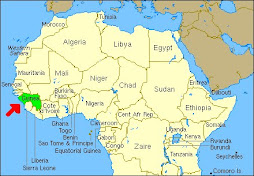I had an encounter with some real traditions today. Parts of it made me say “What?!” and parts were fun. Today the Peace Corps trainees went to visit the local chief. He is technically a king. He lives in a sacred forest, and has a cadre of body guards and servants. Yes, the forest is sacred. (It has a bunch of spirits in it, and it’s where all kings’ initiation rights are performed.) When greeting the king, one must stand up, clap twice, make a little bow, and say “Belon.” It shows respect. I have to try not to giggle.
I got into an argument with one of our Cameroonian trainers. Although a nice guy, this trainer is definitely on the more conservative end of the spectrum. I asked him what the chief actually does. What is he responsible for? He responded with, “Well, what does George Bush do? He doesn’t really do anything.” Whether we like it or not, George Bush is not an inactive figure. Presidents help make policy, but let’s get back to the chief.
So the chief, or one of his representatives must be present at burials. Otherwise the person isn’t dead? Or it doesn’t count? It’s illegal if he is not there? None of this was clear to me. And the conversation was even in English.
My skepticism mounted higher when we got to have a question and answer session with the chief. One of us asked how many wives he has. “About 20.” I’ve swallowed polygamy already, but about 20?! You don’t even know how many wives you have? I’d really like to be about somebody’s wife.
My nerves were calmed some when the approximately 20 wives then served us a fabulous meal. It can be hard to hold it against someone when they feed you so well.
After our visit concluded and we were pulling away through the sacred forest, I noticed the wives + children (of which there are approximately 60). Remember, these are a king’s kids. Oddly, they resembled any other children. Their bottoms were dirty in the same way any other childrens’ bottoms would be dirty. They ran half-clothed around the outdoor cooking fires as children anywhere might. But noticing the chief’s families, I couldn’t help but ask one of our trainers, “How does the king support all these wives and children?”
And here, the answers get interesting. The trainer told me that the community provides money, when asked, to finance the king, his children, his travels, his forest. “So he has no set income? He has a diploma as an agricultural engineer. He doesn’t work, but lives off the community? What happens if people don’t give money?” That apparently is not an option. It’s just not questioned that one would not support the king. Interesting. At least the dirty-bottomed children reassure me that the king is not visibly squandering the citizens’ donations on excesses and luxury.
I pry a little further at dinner that night with Ma. “Ma, how does the king support all those wives and kids? Where does he get his money?” According to Ma, the government gives him a salary. Interesting.
So I’m quite unclear on how it works, but it’s one of the greatest cultural differences I’ve seen thus far. Coming from the American culture of meritocracy, it’s hard to understand how someone would receive special privileges and authority, based not on any level of achievement, and in order to make no clear contributions to society. A last bit of clarification came from my Ma. A woman, of course, can not be the ruler. That is because a woman leader can not make 60 babies, as a king could. It makes sense in the context of 100 years ago that each tribe would want to be as powerful and numerous as possible. But today, it simply means a ruler has to divide has land, a limited resource, among that many more heirs.
Bienvenue au Cameroun.
I'm baaaaaaaack....
14 years ago


1 comment:
It's interesting to read this. You seem to be mystified as to why people keep le chef around. Do you think that the people in that village are crazy? Stupid? Just ignorant? I wonder whether anyone's tried to tell them that they appear to be getting the raw end of this deal?
But I wonder whether the continuance of this institution doesn't bear further scrutiny. I tend not to take as a default position that people are stupid, or even ignorant, and I'm sure you do the same. So, trying to take le chef seriously (or at least to take seriously the fact that others take him seriously) I am left to wonder whether it doesn't have something to do with the sacred forest you mentioned. It makes some sense to me that a forest would be sacred (it keeps out the desert, provides wood, is scary). I wonder how le chef is related to the forest?
Post a Comment